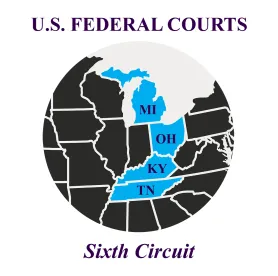The U.S. Supreme Court held in 2014 that the Lanham Act’s false advertising provision governs only commercial, not consumer, injuries. On April 4, 2023, while acknowledging that the distinction between commercial and consumer injuries is “nebulous,” the U.S. Court of Appeals for the Sixth Circuit held that “even commercial businesses that sell goods to end users may qualify as ‘customers’ who cannot sue under the Act—depending on the nature of their injuries.” [1]
In Lewis v. Acuity Real Estate Services, LLC, the defendant was an Internet real estate service that connects home buyers and sellers with real estate agents. These services are free to the home buyers and sellers, but the agents pay a referral fee to be featured on the website. The plaintiff, a real estate agent who signed up for the defendant’s services, alleged that the defendant “mislead[s] home buyers and sellers into thinking that it uses sophisticated means to find the realtor best suited for them.” The plaintiff claimed he was injured by this false advertising because “customers might have found him directly (rather than through [the defendant]) without its false statements” and, in that case, he would not have needed to pay the defendant a referral fee.
While the Lanham Act’s prohibition on false advertising could be read as covering both commercial and consumer injuries, the Supreme Court in Lexmark Intern., Inc. v. Static Control Components, Inc. held that “a consumer who is hoodwinked into purchasing a disappointing product . . . cannot invoke the protection of the Lanham Act” and that “[e]ven a business misled by a supplier into purchasing an inferior product is, like consumers generally, not under the Act's aegis.”[2] Since then, courts have uniformly held that parties can only file suit under the Lanham Act’s false advertising provision for “commercial injuries”—not “consumer injuries.” In Lewis, the plaintiff argued he was suing over a commercial injury because his business was injured. The Sixth Circuit disagreed. Because the plaintiff claimed his damages consisted of the referral fees he paid defendant, the Sixth Circuit characterized his claim as a demand for a refund of “the ‘price’ he paid for [defendant’s] service.” Therefore, the court held that the plaintiff sued the defendant in his status as a consumer of its services, not as a competitor whose “reputation or sales” were injured.
It remains to be seen if Lexmark and its progeny will impact more than just the false advertising provision in the Lanham Act. By holding that “a plaintiff suing under § 1125(a) of the Lanham Act must allege a commercial—not a consumer—injury” (emphasis added), the Sixth Circuit appears to have left the door open for the limitation to apply to claims under § 1125(a) beyond false advertising. This case could also signal a growing reluctance among federal courts to entertain unconventional Lanham Act claims, even where the conduct complained of technically falls under the act’s plain language.
FOOTNOTES
[1] Lewis v. Acuity Real Est. Servs., LLC, 63 F.4th 1114, 4 (6th Cir. 2023)
[2] 572 U.S. 118 (2014)





 />i
/>i
